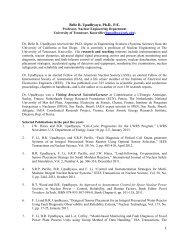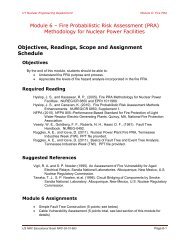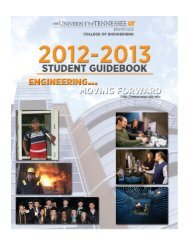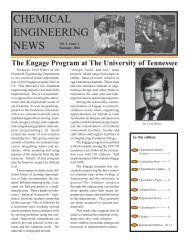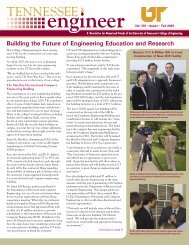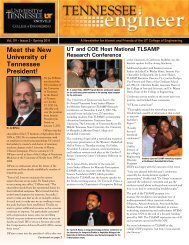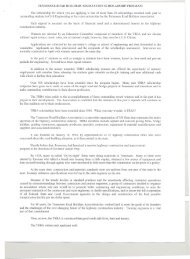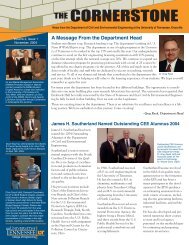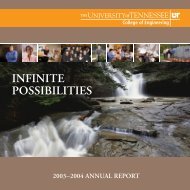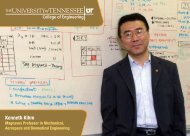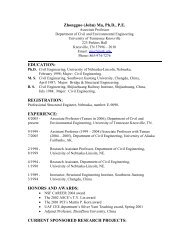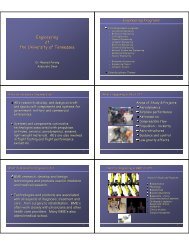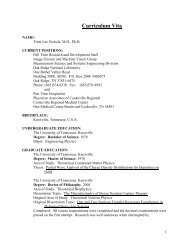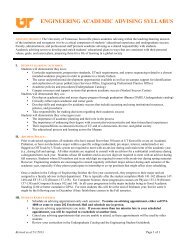CBE 2009 Annual Report - College of Engineering - The University ...
CBE 2009 Annual Report - College of Engineering - The University ...
CBE 2009 Annual Report - College of Engineering - The University ...
Create successful ePaper yourself
Turn your PDF publications into a flip-book with our unique Google optimized e-Paper software.
Outstanding Graduate Student Arash Abedijaberi<br />
6<br />
When he was growing up in Isfahan, Iran, Arash<br />
Abedijaberi had no idea that his academic pursuits<br />
would lead him to the doctoral program in the<br />
Department <strong>of</strong> Chemical and Biomolecular <strong>Engineering</strong><br />
(<strong>CBE</strong>) at the <strong>University</strong> <strong>of</strong> Tennessee, but he has been<br />
here since 2007.<br />
Before he made his journey to the United States,<br />
Abedijaberi attended a different UT: the <strong>University</strong> <strong>of</strong><br />
Tehran. He received his bachelor’s and master’s in the<br />
prestigious Department <strong>of</strong> Biotechnology.<br />
“To be accepted in this program, I had to be among<br />
the top one percent in the national entrance exam for<br />
colleges in Iran,” Abedijaberi said. “My rank became<br />
51 out <strong>of</strong> 1.4 million participants.”<br />
Abedijaberi then moved to St. Louis, Mo.<br />
to study for his Ph.D. from Washington<br />
<strong>University</strong>. It was while at WashU that he<br />
met Dr. Bamin Khomami, who became<br />
his advisor. When Khomami accepted<br />
his position as the Granger and Beaman<br />
Distinguished <strong>University</strong> Pr<strong>of</strong>essor and<br />
Head <strong>of</strong> <strong>CBE</strong>, Abedijaberi reevaluated<br />
his academic plans.<br />
“I am very interested in doing research,<br />
teaching and seeking a faculty position,”<br />
Abedijaberi added. “I decided to work<br />
with only the best people in my field,<br />
and this was the main reason I decided<br />
to transfer to UT and continue working<br />
with Dr. Khomami.”<br />
Abedijaberi completed a second<br />
master’s in environmental, energy and<br />
chemical engineering before following<br />
Khomami to <strong>The</strong> Hill. Abedijaberi’s<br />
interest in chemical and biomolecular<br />
engineering stems from his interest in<br />
and undergraduate study <strong>of</strong> biological<br />
systems. It was under Khomami’s<br />
guidance that Abedijaberi transitioned<br />
from the realm <strong>of</strong> biotechnology and<br />
chemistry into engineering.<br />
“I always enjoyed studying about the<br />
genetics <strong>of</strong> biological organisms,”<br />
Abedijaberi said. “I felt in order to be<br />
able to use these systems for the human<br />
benefit, I needed to be an engineer, and<br />
I decided to change my field.”<br />
“ In my twenty years in academia, I have been very fortunate to work with many gifted graduate<br />
students in my research group. Rarely have I met an individual with as many multiple talents as<br />
Arash. He possesses outstanding analytical thinking ability and great leadership skills on top <strong>of</strong><br />
an impeccable character and a pleasant personality. It has been a joy to watch Arash develop and<br />
mature as a scientist. I am looking forward to watching him go to the next stage <strong>of</strong> his career as<br />
an academician. I foresee a very successful journey. ”<br />
– Dr. Bamin Khomami<br />
Abedijaberi enjoys a challenge, and<br />
making the move into engineering<br />
certainly provided him with one.<br />
“Initially, I received the lowest grade<br />
on the first exam and the highest on<br />
the last exam,” he said. “This is how I<br />
broke through my fear <strong>of</strong> chemical<br />
engineering as a biologist.”<br />
Abedijaberi’s research focuses on the<br />
simulation <strong>of</strong> complex flows <strong>of</strong> Non-<br />
Newtonian fluids. Non-Newtonian<br />
fluids exhibit behavior unlike water,<br />
and Abedijaberi wants to predict<br />
their behavior on the industrial level.<br />
He must describe these materials with<br />
nonlinear partial differential equations<br />
by using supercomputers and then<br />
develop numerical algorithms to solve<br />
these equations.<br />
“I use two supercomputers,” Abedijaberi<br />
commented. “One—called Newton—<br />
consists <strong>of</strong> 1200 nodes, and each node<br />
can be thought <strong>of</strong> as an equivalent to a<br />
single PC.<br />
“<strong>The</strong> other computer is called Kraken,<br />
and it is the third fast supercomputer in<br />
the world. It has 64,000 nodes,” he said.<br />
Like many doctorate students,<br />
Abedijaberi looks forward to teaching<br />
as well as conducting research.<br />
“My goal is to use the engineering<br />
insight I have gained in conjunction<br />
with my biological knowledge and<br />
background to do research as well as<br />
teaching,” Abedijaberi said. “I enjoy<br />
teaching very much, so my aim is to<br />
hold an academic job.”<br />
When he’s not in the lab, Abedijaberi<br />
participates in a number <strong>of</strong><br />
extracurricular activities. He is active in<br />
the UT Outdoor Program —<br />
canoeing, rafting, caving, backpacking<br />
and camping. He also is the president<br />
<strong>of</strong> the Persian Club at the university.<br />
Abedijaberi is a member <strong>of</strong> the<br />
American Institute <strong>of</strong> Chemical<br />
Engineers, Society <strong>of</strong> Rheology<br />
and American Physical Society. He<br />
receives the Helen Jubin Fellowship<br />
and the <strong>College</strong> <strong>of</strong> <strong>Engineering</strong> Ph.D.<br />
Fellowship, and he has won the Jim<br />
and Sandra McKinley Outstanding<br />
Graduate Student Award.<br />
7



